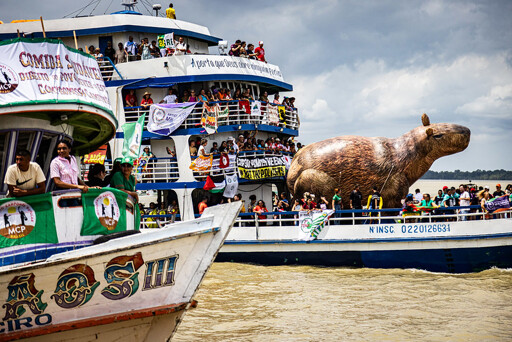Sailing for about an hour in the Amazon river’s delta, a flotilla of dozens of boats carrying hundreds of people raised Indigenous concerns about Brazil’s oil and gas, mining and agricultural expansion in their forests.
In Belém’s Parque da Cidade, climate negotiators are gathered for the first COP hosted in the Amazon rainforest. Outside the conference halls, Indigenous activists are demanding outcomes that address threats from agriculture, fossil fuels and mining in their communities.
The activists will meet at the People’s Summit, a civil society event parallel to COP30, which organisers say is meant to denounce “false” climate solutions. Boat passengers on Wednesday carried signs reading “agriculture passes, destruction stays” and “we are the climate resistance”.
 Nov 10, 2025News
Nov 10, 2025News
COP30 Bulletin Day 1: Host nation Brazil averts agenda row at opening
In a compromise solution, the COP30 presidency will hold consultations on four contentious issues – climate finance, trade measures, 1.5C ambition and transparency of national dataRead more Nov 11, 2025Politics
Nov 11, 2025Politics
COP30 Bulletin Day 2: Ethiopia picked as COP32 host, while COP31 standoff continues
African nations backed Ethiopia’s bid to host the 2027 summit over Nigeria’s, while Australia and Türkiye remain deadlocked over next year’s host decisionRead more Nov 12, 2025Politics
Nov 12, 2025Politics
COP30 Bulletin Day 3: Brazil tries to find a home for tricky issues
Brazil is trying to craft a compromise package on several contentious issues and has dismissed the idea of a roadmap away from fossil fuelsRead more
Raimundo Tupinambá, chief of the Pajurá tribe, said that he and his village were there “to demonstrate against the federal government, the state government and the parliamentarians who are pushing projects that could affect both the environment and us, the Indigenous peoples”.
Chief Raoni Metuktire, an Indigenous leader who was recently awarded the highest decoration of Brazilian diplomacy by President Luiz Inácio Lula da Silva for his decades of climate activism, told the event that communities shouldn’t be facing the climate impacts they have been experiencing, among them an extreme drought last year that scientists linked to climate change.
“This river where we are could dry up, too,” Raoni said.

Chief Raoni Metukire holds up a sign saying “the climate emergency – the answer is us” on 12/11/2025 (Photo: Mariel Lozada)
Raoni also talked about the recent licences Lula’s government gave to Petrobras to explore oil off the Amazon coast, saying that projects like that could cause severe problems for the world – “first us, the Indigenous peoples, but also all of you, all of us will have environmental problems.”
They were speaking the day after Indigenous protesters clashed with security guards as they stormed their way into the COP30 conference venue. When asked about that, Indigenous groups at the flotilla said they didn’t organise it, but weren’t necessarily against it.
Sailing along the soy corridor
One of the main boats in the flotilla was a vessel named “Caravan of the Response”, a nod to the “we are the response” slogan from Indigenous peoples, which had been sailing for a week, having started 3,000 kilometres inland in Sinop, Mato Grosso.
The route is meant to emulate Brazil’s “soy corridor”, a network of roads, railways and waterways designed to move soybeans from inland production areas to ports for export. One of the boats carried a banner reading “agribusiness doesn’t fill your plate”.

A banner on the “Caravan of the Response” ship opposing the Ferrogrão railway on 12/11/2025 (Photo: Mariel Lozada)
The vessel also carried a large banner rejecting the Ferrogrão, a railway of nearly 1,000 kilometres that aims to become part of the soy corridor and would connect Sinop – Brazil’s soybean capital – to the state of Pará, where Belém is located. The project has been halted since 2021 due to possible environmental impacts. Tupinambá said Ferrogrão is one of his people’s main fights and called its possible construction a “predatory activity”.
If built, the railway would affect at least six Indigenous lands, home to approximately 2,600 people, and 17 conservation areas, according to Brazilian media.
Inside the boat, on the first of four floors, activists played music, danced and sold traditional Indigenous food. The top floors were full of hammocks reserved for the people who did the trip from Sinop.
Making the case for rivers
With flags reading “The Arapiuns River talks, we listen”, the group of hundreds of Indigenous activists also sought to raise awareness on the health of rivers in the Amazon region, which experienced severe drought last year.
Arapiuns, a river over 1,300 km from Belém, has a tributary connection to the Tapajós, the fifth biggest of all the rivers that lead to the Amazon River. During the 2024 drought, it dried up to its lowest levels.

Jéssica Kumaruara holds up her sign on 12/11/2025 (Photo: Mariel Lozada)
Jéssica Kumaruara, an Indigenous activist from the region, was on the boat holding a sign that read “the Tapajós River, enchanted dwellings that also sustain us, is asking for help.”
She grew up in the area, and told Climate Home News that she and her community will fight to defend their beloved river “that the government wants to turn into a route for agribusiness”.
“When they kill our river, when they leave it in the forests, they are killing us too. It is a way of killing us – and we are here to say that we are not going to stop, we are not going to keep quiet, we are going to fight until the end.”
The post “They are killing us too”: Amazon flotilla raises Indigenous concerns at COP30 appeared first on Climate Home News.
From Climate Home News via this RSS feed

